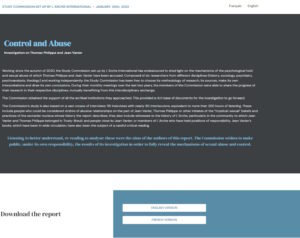The secrecy maintained by the Vatican’s ‘Holy Office’ in the 1950s, over the findings of an investigation into the activities of an abusive secretive group, helped the group to reform and continue its activities for decades. One of its members was the internationally renowned founder of the ‘L’Arche’ communities for the intellectually disabled, Jean Vanier.
This is a finding of a 900-page academic report, sponsored by L’Arche, released on Jan 30th, 2023 and reviewed by the National Catholic Reporter (NCR).
The abuse victims did not include intellectually disabled members of the L’Arche communities: they were able women seeking spiritual guidance. The abuse was confined to a small highly secretive group and did not spread within L’Arche, according to the study.
Founded by a French Dominican priest, Thomas Philippe, who became the young Jean Vanier’s most important mentor in the early 1950s, the banned group – originally entitled ‘L’Eau Vive’ – was forbidden by the Vatican’s Holy Office (now the CDF) to re-convene but later reformed and continued its activities in total secrecy, unknown to the French Dominicans – aided by the secrecy practised over the initial investigation.
Writing of the initial Vatican investigation in the 1950s, the authors of the 900 page study declare: “…We must emphasize that the nondisclosure of the exact causes of T. Philippe’s conviction is precisely what helped maintain his reputation for holiness and rewrite history as he saw fit.”
As a member of the secret group Jean Vanier became celebrated by many as a ‘living saint’ – which made it especially difficult for the women he abused even to think of speaking out.
“On each occasion, Vanier’s reputation for holiness, his prophetic charisma acknowledged by many, and the collective belief in his legitimate authority on all matters — spiritual, human, professional — helped to create an atmosphere in which it was almost impossible for these women to question Vanier’s attitudes, words and actions with them,” according to Claire Vincent-Mory, a member of the commission that produced the 900-page study.
For the more comprehensive NCR summary report of this L’Arche study, click here.


0 Comments